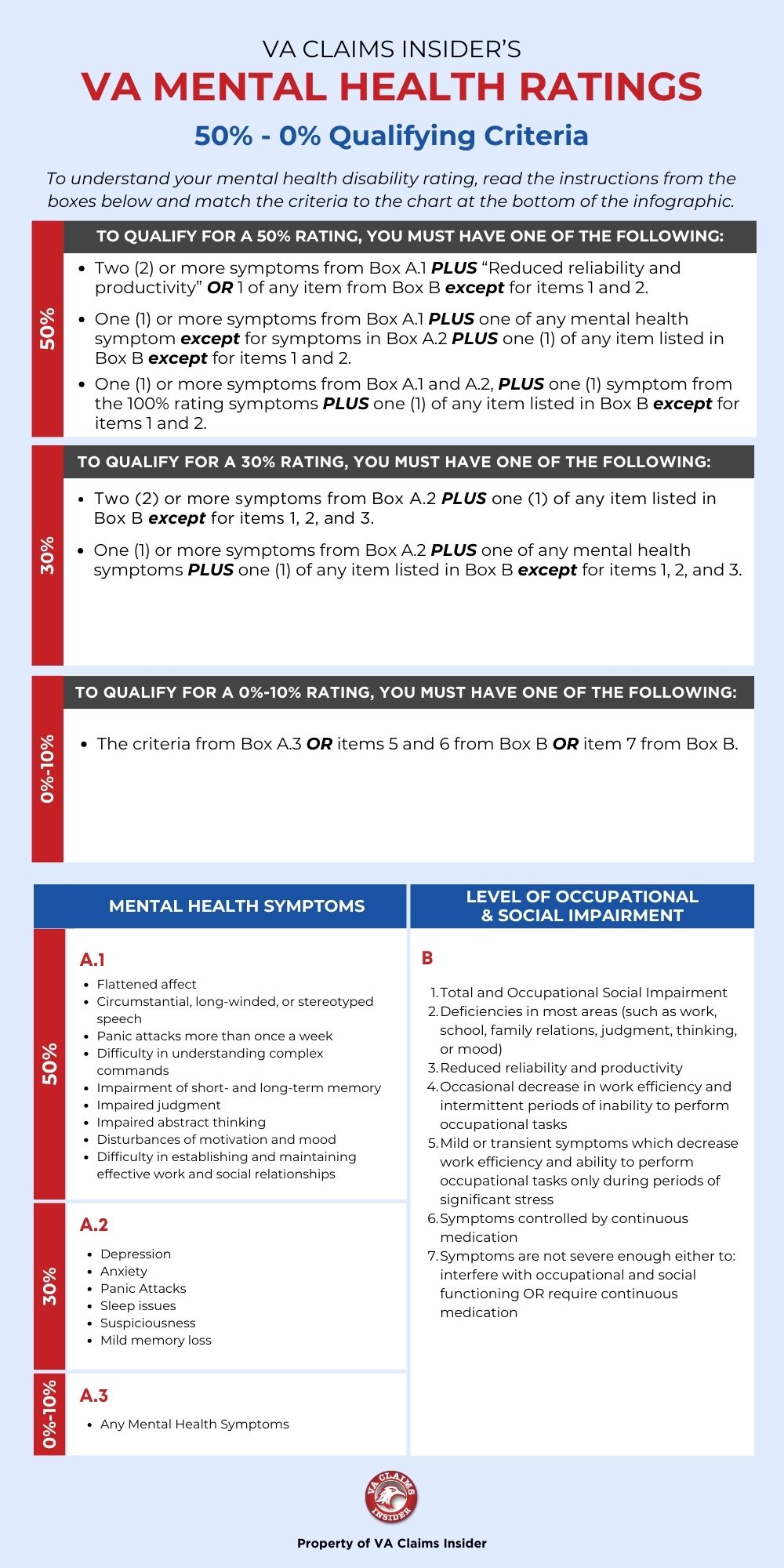Looking for Expert-Level VA Claim Answers?📱Call Us Now! 737-295-2226
Fellow veterans, if you’re filing a VA disability claim for a mental health condition, proving the full extent of your occupational and social impairment is mission critical to securing the VA rating and compensation you deserve.
The VA assigns mental health ratings from 0% to 100% based on the severity of your symptoms and how they affect your ability to work, maintain relationships, and function in daily life.
Unfortunately, many veterans struggle to provide the right medical evidence, leading to underrated claims or outright denials.
This article from VA disability expert Brian Reese will show you exactly what the VA looks for, how to document your impairment effectively, and the key strategies to maximize your VA disability rating for mental health conditions.
Table of Contents
Summary of Key Points
- The VA Rates Mental Health Based on Severity of Symptoms and Impacts to Your Occupational & Social Impairment: The VA assigns disability ratings from 0% to 100% using 38 CFR § 4.130, evaluating how your mental health symptoms impact your ability to work and maintain social relationships.
- Strong Medical Evidence is Essential: Independent psychiatric evaluations, treatment records, and supporting medical documentation are critical for proving the severity of your condition and avoiding an underrated claim.
- Occupational & Social Impairment Must Be Well-Documented: Personal statements, work performance records, attendance logs, employer statements, and buddy letters from family and friends strengthen your claim.
- Proactive Claim Strategies Increase Success: Filing a Fully Developed Claim (FDC) with all required medical evidence, tracking your symptoms, and challenging lowballed ratings through appeals can maximize your VA disability rating.
The VA’s Mental Health Evaluation Criteria and Rating System
The VA evaluates mental health conditions using the General Rating Formula for Mental Disorders outlined in 38 CFR § 4.130.
This rating system assigns disability percentages—0%, 10%, 30%, 50%, 70%, or 100%—based on the severity of your symptoms and their impact on your ability to work and maintain social relationships.
Each percentage level corresponds to specific symptoms and degrees of functional impairment, making clear and thorough documentation essential to securing the rating you deserve.
The VA uses a three-part test from an online Eval Builder Tool to determine your final VA rating for mental health:
- First, there’s a subjective assessment of symptoms from the list of 31 VA mental health symptoms. Your mental health symptoms can come from the medical evidence submitted with your claim as well as the results of your C&P exam for mental health.
- Second, there’s a subjective assessment of how those symptoms impact your occupational and social impairment, meaning your work, life, and social functioning. This also comes from your submitted medical evidence and the results of your C&P exam.
- Finally, the online tool lists your approximate mental health rating at 0%, 10%, 30%, 50%, 70%, or 100%; however, the VA Rater has the ability to override it, and go one rating level above or one rating level below the recommended disability percentage depending on your severity of symptoms.
The Critical Role of Medical Evidence in Mental Health VA Claims
Medical evidence is the foundation of a strong VA mental health claim.
Without clear documentation, the VA may underrate or deny your claim due to a lack of substantiated impairment.
To maximize your chances of success, ensure your claim includes the following:
- Independent Psychiatric Evaluations & IMO – A thorough evaluation from a licensed psychologist or psychiatrist should detail your diagnosis, symptom severity, and the impact on occupational and social functioning. An independent psychological evaluation can strengthen your case, especially if the VA’s assessment from the C&P exam downplays your symptoms.
- Treatment Records – Provide consistent documentation of ongoing treatments, including therapy sessions, medication history, and psychiatric hospitalizations. If your condition hasn’t improved despite treatment, emphasize this, as it demonstrates persistent functional impairment.
- Historical Global Assessment of Functioning (GAF) Scores – While the VA no longer uses GAF scores under DSM-5 guidelines, past scores can still provide useful context about how your symptoms have progressed over time. If you had a low GAF score before DSM-5, include it as supporting evidence of long-standing impairment.
By ensuring your claim is backed by strong medical evidence, you significantly increase your chances of receiving the correct VA disability rating for your mental health condition.
Key Factors in Proving OCCUPATIONAL Impairment
- Personal Statements: Provide a detailed written statement (VA Form 21-4138) explaining how your mental health condition affects your ability to work, including difficulties with focus, communication, completing tasks, handling stress, or maintaining employment stability. Be specific about workplace challenges and their impact on your daily responsibilities.
- Work Performance Records: Document any decline in job performance, such as written warnings, demotions, or terminations related to your mental health condition.
- Attendance Records: Keep track of absences or tardiness due to your condition, as frequent time off can indicate significant occupational impairment.
- Employer Statements: Obtain written statements from supervisors or colleagues detailing observed changes in your work habits, behavior, or productivity.
- Independent Mental Health Evaluation From a Psychologist: A detailed independent medical opinion from a licensed psychologist, psychiatrist, or other mental health provider can be critical in establishing the severity of your occupational impairment. This should include a clinical diagnosis in accordance with DSM-5 criteria, an assessment of symptoms, and a professional determination of how your mental health condition limits your ability to perform work-related tasks.
Key Factors in Proving SOCIAL Impairment
- Personal Statements: Write a detailed written statement (VA Form 21-4138) explaining how your condition affects daily social interactions, such as difficulty speaking with coworkers, avoiding phone calls, or struggling with basic communication in public settings. If applicable, describe any emotional outbursts, paranoia, or extreme anxiety that hinder relationships.
- Third-Party Observations: Gather lay/witness statements (VA Form 21-10210) from family members, friends, or community members who can attest to changes in your social interactions and behaviors, such as increased isolation, mood swings, or difficulty maintaining relationships.
- Medical Records: Include documentation from mental health professionals that notes social withdrawal, isolation, or difficulties in social settings, such as difficulty trusting others, irritability, or avoidance of crowds.
- Participation in Activities: Record any reduction or cessation of hobbies, community involvement, or social engagements due to your mental health condition. This includes avoiding family gatherings, quitting clubs, sports, or church activities, or declining invitations to social events.
- Statement from a Doctor or Psychologist: A professional mental health provider’s statement can help validate your social impairment by documenting how your condition limits your ability to form and maintain relationships, engage in social activities, and function in social settings.
Aligning Medical Evidence with the VA Rating Criteria for Mental Disorders
To strengthen your mental health claim, you should have a general understanding of how your documented symptoms and impairments align with the VA’s mental health rating criteria:
| Occupational and Social Impairment and Approximate Severity of Symptoms for VA Mental Health Claims | VA Disability Rating | Minimum Monthly Payment |
|---|---|---|
| Total occupational and social impairment, due to such symptoms as: gross impairment in thought processes or communication; persistent delusions or hallucinations; grossly inappropriate behavior; persistent danger of hurting self or others; intermittent inability to perform activities of daily living (including maintenance of minimal personal hygiene); disorientation to time or place; memory loss for names of close relatives, own occupation, or own name. | 100% | $3,831.30 |
| Occupational and social impairment, with deficiencies in most areas, such as work, school, family relations, judgment, thinking, or mood, due to such symptoms as: suicidal ideation; obsessional rituals which interfere with routine activities; speech intermittently illogical, obscure, or irrelevant; near-continuous panic or depression affecting the ability to function independently, appropriately and effectively; impaired impulse control (such as unprovoked irritability with periods of violence); spatial disorientation; neglect of personal appearance and hygiene; difficulty in adapting to stressful circumstances (including work or a worklike setting); inability to establish and maintain effective relationships. | 70% | $1,759.19 |
| Occupational and social impairment with reduced reliability and productivity due to such symptoms as: flattened affect; circumstantial, circumlocutory, or stereotyped speech; panic attacks more than once a week; difficulty in understanding complex commands; impairment of short- and long-term memory (e.g., retention of only highly learned material, forgetting to complete tasks); impaired judgment; impaired abstract thinking; disturbances of motivation and mood; difficulty in establishing and maintaining effective work and social relationships. | 50% | $1,102.04 |
| Occupational and social impairment with occasional decrease in work efficiency and intermittent periods of inability to perform occupational tasks (although generally functioning satisfactorily, with routine behavior, self-care, and conversation normal), due to such symptoms as: depressed mood, anxiety, suspiciousness, panic attacks (weekly or less often), chronic sleep impairment, mild memory loss (such as forgetting names, directions, recent events). | 30% | $537.42 |
| Occupational and social impairment due to mild or transient symptoms which decrease work efficiency and ability to perform occupational tasks only during periods of significant stress, or symptoms controlled by continuous medication. | 10% | $175.51 |
| A mental condition has been formally diagnosed, but symptoms are not severe enough either to interfere with occupational and social functioning or to require continuous medication. | 0% | Non-Compensable |
VA Mental Health Rating Criteria From 0% to 50%

VA Mental Health Rating Criteria From 70% to 100%

31 VA Mental Health Symptoms for Rating Purposes
Here’s a list of the 31 mental health symptoms recognized by the VA along with a detailed explanation of each symptom from the Disability Benefits Questionnaire for Mental Disorders:
- Depressed Mood: A persistent feeling of sadness or a lack of interest in external stimuli, which might manifest as a significant decrease in the person’s overall mood.
- Anxiety: Frequent or constant feelings of worry, nervousness, or unease about something with an uncertain outcome or about general aspects of daily life.
- Suspiciousness: An irrational or excessive distrust of others, which can lead to significant social dysfunction and isolation.
- Panic Attacks (weekly or less often): Sudden onset of intense fear or discomfort that peaks within minutes, including symptoms such as palpitations, sweating, shaking, shortness of breath, and feelings of impending doom, occurring infrequently.
- Panic Attacks (more than once a week): Similar to the above but occurring with a greater frequency, which can significantly disrupt daily functioning.
- Near-continuous Panic or Depression: These conditions significantly impair one’s ability to function independently, appropriately, and effectively due to their constant presence.
- Chronic Sleep Impairment: Ongoing difficulties in falling or staying asleep, which affects daily functioning and overall health.
- Mild Memory Loss: Includes forgetting names, directions, or recent events, which can affect daily functioning but might not necessarily impede professional responsibilities or personal relationships significantly.
- Impairment of Short and Long Term Memory: This is more severe than mild memory loss and includes difficulty retaining new information or recalling previously known information.
- Memory Loss for Names of Close Relatives, Own Occupation, or Own Name: A severe level of memory loss, impacting the individual’s ability to recall significant, well-established information about their life.
- Flattened Affect: A lack of emotional expressiveness, where the person shows minimal emotional reactions to various circumstances.
- Circumstantial, Circumlocutory, or Stereotyped Speech: Speech that is indirect and delayed in reaching the point, often because of unnecessary detail or inappropriate repetition of phrases.
- Speech Intermittently Illogical, Obscure, or Irrelevant: Speech that may not follow logical patterns, contains unclear expressions, or is tangentially related to the conversation’s context.
- Difficulty in Understanding Complex Commands: Challenges in comprehending and processing multifaceted and layered instructions.
- Impaired Judgment: Reduced ability to make thoughtful decisions, which might include an inability to understand the consequences of one’s actions.
- Impaired Abstract Thinking: Difficulty in understanding abstract concepts and using those concepts to problem-solve effectively.
- Gross Impairment in Thought Processes or Communication: Significant disruptions in the ability to think clearly or communicate effectively.
- Disturbances of Motivation and Mood: Variability or changes in mood and motivation that interfere with daily life.
- Difficulty in Establishing and Maintaining Effective Work and Social Relationships: Problems with forming and sustaining relationships in both personal and professional contexts.
- Difficulty Adapting to Stressful Circumstances: Challenges with adjusting to stressful situations typically manageable by average persons.
- Inability to Establish and Maintain Effective Relationships: More severe difficulties with social relationships, where maintaining any form of consistent interaction is problematic.
- Suicidal Ideation: Thoughts about taking one’s own life, which may range from vague ideas to detailed planning.
- Obsessional Rituals Which Interfere with Routine Activities: Repetitive behaviors or thoughts that are intrusive and interfere with normal routines and activities.
- Impaired Impulse Control: Difficulty controlling impulses which can manifest as episodes of unprovoked irritability or violence.
- Spatial Disorientation: Trouble understanding and remembering the layout of places, leading to confusion about one’s location.
- Persistent Delusions or Hallucinations: Ongoing false beliefs or perceptions in the absence of external stimuli, which may affect behavior and interaction.
- Grossly Inappropriate Behavior: Actions that are dramatically out of context and inappropriate for the situation or social norms.
- Persistent Danger of Hurting Self or Others: Ongoing risk of causing harm to oneself or others, possibly requiring intervention to prevent such outcomes.
- Neglect of Personal Appearance and Hygiene: Significant lack of concern about personal grooming and cleanliness, which is noticeable by others.
- Intermittent Inability to Perform Activities of Daily Living: Periodic failures to manage everyday tasks independently, such as bathing, dressing, or feeding oneself.
- Disorientation to Time or Place: Confusion about the current time or location, which can lead to difficulties navigating daily life.
Pro Tips to Strengthen Your VA Claim for Mental Health Conditions
- Be Specific in Your Personal Statement – Clearly describe how your mental health condition affects your daily life, work performance, and relationships. Provide concrete examples of symptoms such as panic attacks, memory issues, difficulty concentrating, or inability to maintain employment.
- Use a Disability Benefits Questionnaire (DBQ) – Consider having your treating mental health provider complete a DBQ for PTSD Review or Other Mental Disorders to document the severity of your symptoms and how they impair your occupational and social functioning.
- Get a Strong Nexus Letter – If your condition is not already service-connected, obtain a nexus letter from a qualified psychologist or psychiatrist linking your mental health disorder to your military service or a secondary service-connected condition.
- Seek Consistent Mental Health Treatment – Regular treatment with a VA or private provider establishes a medical history of your condition and strengthens your claim. Keep track of medications, therapy sessions, and psychiatric hospitalizations if applicable.
- Gather Statements from Family, Friends, and Employers – Buddy letters (VA Form 21-10210) from family members, coworkers, or former supervisors can reinforce how your condition affects your behavior, work performance, and ability to maintain relationships.
- Track Your Symptoms and Their Impact – Maintain a journal documenting the frequency and severity of your symptoms, such as panic attacks, suicidal thoughts, mood swings, or social isolation. This can serve as valuable evidence in your claim.
- Ensure Your C&P Exam is Accurate – Be uncomfortably vulnerable during your mental health C&P exam. Describe your worst days with specific examples and don’t downplay your symptoms. Here’s a list of our Top 10 C&P Exam Tips!
- Have a General Understanding of How Your Current Symptoms Relate to VA Rating Criteria – Review the VA General Rating Formula for Mental Disorders (38 CFR § 4.130) and ensure your documented symptoms align with the appropriate rating level (0%, 10%, 30%, 50%, 70%, or 100%) based on occupational and social impairment.
- File a Fully Developed Claim (FDC) for Faster Processing – Submitting a Fully Developed Claim (FDC) with all medical records, nexus letters, DBQs, and lay statements upfront can help avoid delays and increase the likelihood of approval.
- Don’t Quit if Denied – Appeal and Keep Fighting – If your VA claim is denied or underrated, file a Higher-Level Review (HLR), Supplemental Claim, or Board Appeal. Many veterans eventually win their mental health claims by submitting new evidence, correcting C&P exam errors, or seeking expert guidance.
Conclusion & Wrap-Up
Fellow veterans, proving your severity of symptoms and their effect on occupational and social impairment is the key to securing the highest possible VA rating for your mental health condition.
The VA evaluates mental health claims based on symptom severity and functional impact, so strong medical evidence is critical.
The best way to win your VA mental health claim is to file a Fully Developed Claim (FDC) with all required medical records, nexus letters, DBQs, personal statements, and buddy letters upfront.
Be proactive—monitor your claim status, attend your C&P exam, and challenge any lowballed ratings or wrongful denials through appeals.
If you need expert help navigating the VA claims process, our team of VA claim experts is ready to educate, support, and empower you to victory.
📱If you’re sick and tired of waiting and want expert guidance to get the VA rating and compensation you deserve faster, CALL US RIGHT NOW at 737-295-2226 for a no-obligation VA claim consultation!
Want Expert-Level Help With Your VA Claim? WE GOT YOUR SIX!
How does VA Claims Insider help veterans?
We make the confusing and frustrating VA claim process EASY through our 8-step proprietary system and one-on-one coaching; we’re the VA Claim EXPERTS you can trust, and YOU are never alone in this fight against the VA!
You’ll also receive VA disability expert Brian Reese’s SEM Method Blueprint—a proven formula that has helped over 25,000 veterans win their VA disability claims faster:
Strategy + Education + Medical Evidence = VA Rating and Compensation You Deserve FASTER!
Start today and unlock an exceptional level of service you deserve for serving our country:
➡️ You’ll hear from a VA Claim Expert over email within 15 minutes of signing up today.
➡️ You’ll hear from your Veteran Coach team within 24 hours of all inquiries during normal business days/hours.
➡️ Our terms are simple: IF WE DON’T WIN, YOU DON’T PAY. You have nothing to lose and everything to gain!
Click the red button below to start the process of winning your VA claim right now:
Fellow Veterans: Are You Ready to WIN, SERVICE-CONNECT, and INCREASE Your VA Disability Rating FASTER? We Can Help!

- VA Claims Insider is the #1 most trusted name in VA disability claims.
- Work directly with a VA claims coach who can help lead you to VA claim victory.
- 25,000+ disabled veterans served in our membership programs since 2016.
- 30% average rating increase for veterans who complete our #1 rated Elite program.
- 4.7/5.0 average rating out of 5,500+ total reviews; over 4,500 5-star reviews.
About the Author

Brian Reese
Brian Reese is a world-renowned VA disability benefits expert and the #1 bestselling author of VA Claim Secrets and You Deserve It. Motivated by his own frustration with the VA claim process, Brian founded VA Claims Insider to help disabled veterans secure their VA disability compensation faster, regardless of their past struggles with the VA. Since 2013, he has positively impacted the lives of over 10 million military, veterans, and their families.
A former active-duty Air Force officer, Brian has extensive experience leading diverse teams in challenging international environments, including a combat tour in Afghanistan in 2011 supporting Operation ENDURING FREEDOM.
Brian is a Distinguished Graduate of Management from the United States Air Force Academy and earned his MBA from Oklahoma State University’s Spears School of Business, where he was a National Honor Scholar, ranking in the top 1% of his class.



